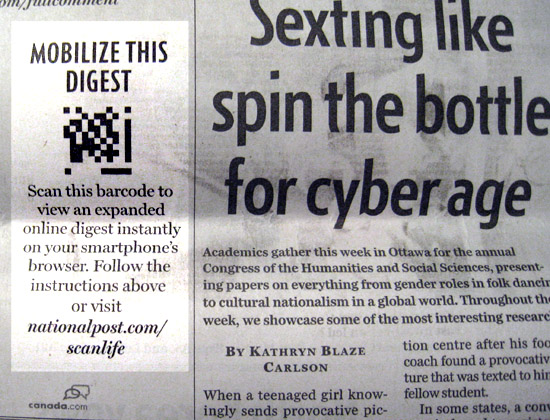
If you are a reader of Canada’s (other) national newspaper the National Post, you may have noticed that they are trying out something neat with 2D barcodes a.k.a QR Codes. They don’t quite look like normal QR codes but this is incidental. The idea is that the codes are a printed link between the ink-on-flattened-wood-pulp edition and the online properties of the Post. Put differently, it’s one adventurous way for a dead-tree media company to play spin the bottle with the cyber age.
You need a mobile phone, a smart phone, basically an iphone or a recent model blackberry, and special application to make it useful. If useful it is. I would really like to see this experiment be successful. However, a brief informal facebook poll of friends (and I have a lot of pretty nerdy friends) failed to reveal anyone who had actually tried the feature. Similarly Michele and I learned first hand how hard it is make a QR code campaign work when we tried it first hand with an (mostly failed) impromptu QR-code social experiment at SXSW09.
Unlike Japan, North Americans just don’t seem to be ready for optical codes yet. Our phones don’t have built in readers. You have to manually download an app first which takes several minutes and some technical savvy. The iPhone has a terrible camera for reading them. And unless you provide a lot of context around the code and where it points to, people are suspicious of it being spammy.
Nonetheless, you gotta give the Post points for effort and experimentation.
It’s a damn tough time to be in media. Online is killing not just reader attention spans but also advertiser spend. The barbarians are at the gate for traditional media empires. Like a declining Rome hot linking to the visigoths, newspapers find themselves in a weird position, trying to promote print and online channels for news.
But here, wait for it, is the Post real real secret plan of genius. These codes are really for advertisers. If (big if) the Post can get a significant installbase of users, using a NationalPost mobile app, AND a proprietary QR code reader, then they have a killer product to sell to the print advertisers. Suddenly print ads become actionable, print advertisers can get real-time conversion, real time metrics on the performance of their ads. And the post has killer app the globe and the Star don’t. The codes would continue to be used for both editorial as well as ad features so, in theory, there is always someting in it for the consumer too to install the app.
Genius eh? If you’ll go out there and use it
Photo: poignantly capturing a clash of young and old, of mobiles, mores and business/teenage models. FYI: To their credit, the Post did not provide any links to “additional online content” related to teenage sexting. Keep it classy Posties.

